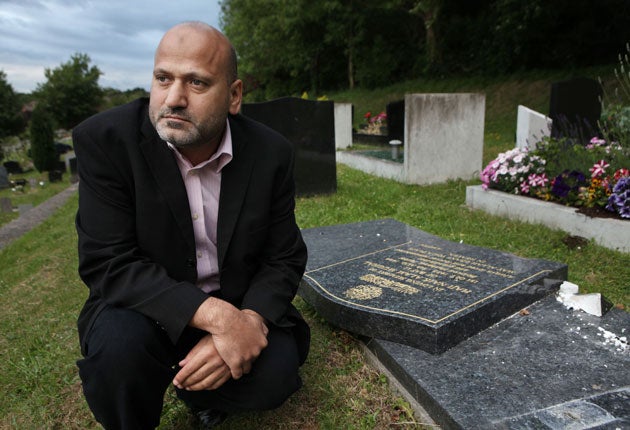Muslims call for action against hate crimes
Islamophobic attacks have been on the rise, with an increase in assaults, vandalised mosques and desecrated graves

Britain's largest mainstream Muslim organisation will today call for "robust action" to combat Islamophobic attacks amid fears of growing violence and under-reporting of hate crimes.
The Muslim Council of Britain (MCB) will challenge the "ethnic profiling" of members of its community, claiming that minorities are 42 times more likely to be targeted under the Terrorism Act.
MCB secretary-general Farooq Murad will tell the council's AGM in Birmingham that there must be more monitoring of anti-Muslim crimes in response to incidents including violent assaults, death threats and the desecration of graves. He will also complain that not enough is being done to encourage communities to report crimes to the police.
The calls, supported by leading academics, a counter-terrorist think-tank and Muslim groups, come as the Metropolitan Police confirmed a total of 762 Islamophobic offences in London since April 2009, including 333 in 2010/11 and 57 since this April. A spokesman said the Met was aware of "significant" under-reporting of hate crime, and acknowledged "missed opportunities" to keep victims safe.
Despite rising concerns about the impact of hate crime on all communities, the Association of Chief Police Officers (ACPO) said that data on such offences are not collated centrally as this would be an "overly bureaucratic process for local forces". Assistant Chief Constable Drew Harris, who leads the police on hate crime, was unavailable for comment.
In his speech, Mr Murad is expected to warn that attacks are increasing. "Islamophobic attacks, on persons and properties, are committed by a tiny minority, but the number of incidents is increasing. Robust action is necessary and this means we must have a systematic manner of recording, monitoring and analysing such attacks. Only a small number of police forces record anti-Muslim hate crimes."
He will claim that figures collated from only two police forces indicate 1,200 Anti-Muslim crimes in 2010, as opposed to 546 anti-Semitic crimes from all the police forces in the UK.
Muslims from across the country have reported attacks on imams and mosque staff, including petrol bombings and bricks thrown through windows, pigs' heads being fixed prominently to entrances and minarets, vandalism and abusive messages.
Mr Murad will tell the gathering at the Bordesley Centre: "It is not a piece of cloth on someone's head or face, the shape of someone's dress, a harmless concrete pillar on a religious building or even not speaking a common language that creates alienation."
Dr Robert Lambert, co-director of
the European Muslim Research Centre and research fellow at the Institute of Arab and Islamic Studies, Exeter University, said a decade of research will report before the 10th anniversary of 11 September.
His report will provide comprehensive figures on attacks on mosques, Islamic organisations and Muslim institutions, while avoiding confusion over race-related or random attacks.
Dr Lambert, a former counter-terrorism police officer, said problems over data collection stemmed from a lack of political will, rather than from the police efforts – and that the onus was on Muslim communities to emulate the "outstanding" data collection around anti-Semitic crimes conducted by the Community Security Trust.
He added: "When I was working in the police, some of the notable spikes in incidents came after terrorist events such as 9/11 and 7/7. We have more than 50 incidences of fire-bomb attacks and we have yet to reach the 10-year anniversary. But no leading politician has seen fit to stand shoulder to shoulder with mosque leaders. That is quite something."
Ghaffar Hussain of the counter-extremism think-tank Quilliam said: "Anti-Muslim bigotry is very real. It does exist. There are sections of our society who are deeply suspicious of Muslims, even of Muslims building mosques, and are threatened by the idea of Islamification across Europe."
Some 40 to 60 per cent of the mosques, Islamic centres and Muslim organisations in the UK have suffered at least one attack since 9/11.
Taji Mustafa, spokesman for Hizb ut-Tahrir in Britain, said: "Xenophobic attacks on Muslims have increased under successive governments. In a manipulative alliance with some sections of the media, they have demonised Islam as part of their foreign policy propaganda."
Case study: Community leader and diversity trainer
Mohammed Khaliel, 48, lives in High Wycombe and was among horrified families who discovered Muslim graves at a local cemetery had been desecrated on 20 April
"I am the community representative, but, equally, I'm a victim of it as well. My mother had been buried there four weeks earlier.
This is not the first time that there has been desecration. This time it was much more severe, with more than 25 graves attacked. I've got photographic evidence of someone hammering them. It was a proper effort to deliberately do it.
It was pure hatred. You have a graveyard that is 200 years old that has a small section for Muslims, and only that section was attacked. It was clearly Islamophobia.
I'm on a number of advisory boards, including Scotland Yard, so I get notified as a courtesy on any Islamic issues relating to the community. On this one, they asked me to sit down before they told me.
A lot of the relatives belong to our mosque. We called an emergency meeting, and we had to calm people down. There was a stage at which, if we had not handled things properly, it could have turned into an expression of anger. But that didn't discount the hurt they felt for [their] loved ones to be attacked like that."
